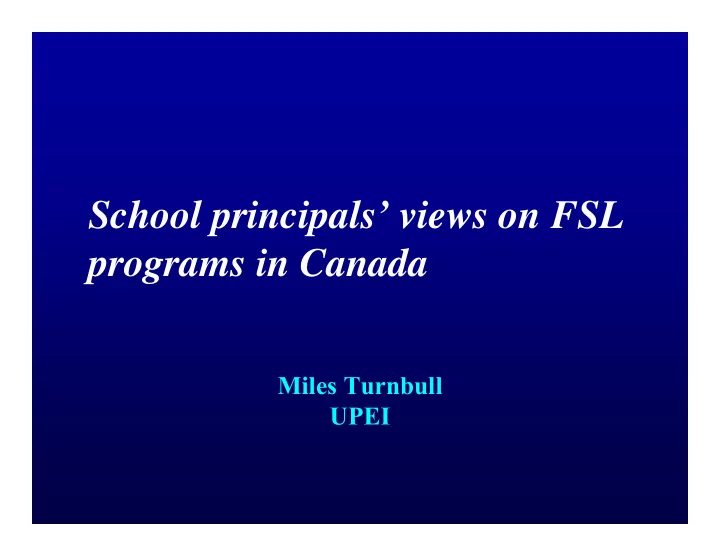

School principals’ views on FSL programs in Canada Miles Turnbull UPEI
Goal of study: Guiding question • To provide insights into beliefs, attitudes and practices (related to FSL programming and FSL teachers) of a group of stakeholders - PRINCIPALS - who make decisions in Canadian public schools
Background • MANY anecdotes and perceptions, maybe misperceptions • Previous research….. Few studies and many are American – some are very old
Previous research: Working conditions • Lapkin, MacFarlane & Vandergrift (2006) -principals considered very supportive by 53% of participants - -62% reported NOT having bilingual administrators
Methods • Focus group and individual interviews to gather ideas and seek advice from key stakeholders • Literature review • Web-based survey • Recruitment: key newsletters, email networks, direct mailing to schools, CPF email to schools • Individual interviews
Response • Not great! • 403 participants
Profile of participants • All provinces, 2 territories (NWT, Yukon) • 91% Anglophones, 40% bilingual • 33% had taught FSL in the past
Participants by province & territory • BC= 12.5% • ON= 25% • NWT = 1.1% • QC=2.3% • Yukon = 0.4% • NB= 11.4% • Nunavut = 0% • PE= 3.8% • AB= 10.6% • NS= 14% • MB= 6.5% • NF= 7.6% • SK= 4.9%
Beliefs and experiences • 58% agree that FSL should be mandatory in all grades BUT… • 45% agree that FSL should be required for high school graduation
Beliefs and experiences • 85% agree that students should learn at least one language other than English at school • 62% believe that this language should be French • 56% agree that other second languages are as beneficial as French in Canada
Beliefs and experiences • 57% agree that core French is less prestigious than FI • 15% agree that FI is the only way to really learn French • 82% believe that learning FSL contributes to L1 literacy skills
Beliefs and experiences • 46% disagree that newly arrived immigrants should be exempt from FSL, 24.5% agree and about 29% on the fence • 46% disagree that students with learning difficulties should be exempt from FSL, 31% agree and about 23% on the fence • 95% disagree that it is more important for girls to study French than for boys!! ☺
French in the school (district) • 75% agree that senior administration in the school district support all FSL programs • 67% agree that parents in the school district support all FSL programs • 82% agree that the school principal should be a key player in promoting FSL programs
French in the school (district) • 72% and 76% agree that they have had troubles hiring qualified core French and immersion teachers (respectively) • Over 80% agree that that they have had troubles hiring qualified substitute teachers for all FSL programs
French in the school (district) • 24% agree that there are tensions between FSL teachers and non-FSL teachers in their schools • 65% agree that it is ok for FSL teachers to speak French amongst themselves in the staffroom (35% disagree)
French in the school (district) • 70% reported NO extra-curricular activities in French in their school • 52% rated their library collection in French as poor or very poor • 81% had a unilingual anglophone librarian
French in the curriculum • Ranking of importance of school subjects: English language arts, math, sciences, French and social studies • Drop-out from French competition from other subjects, limited number of courses, graduation requirements, post-secondary requirements exclude French, low status of French
FSL teachers • A large majority of participants believe that teachers’ French should be tested before hiring (85% in core, 90% in FI) • Most important criteria for hiring FSL teachers: skills in French, classroom management, motivating skills and enthusiasm
Participants’ professional development • 45% had done FSL-specific PD • 73% interested in FSL-specific PD • 62% willing to devote 1-2 days per year to FSL-specific PD
Differences across types of respondents (correlations and ANOVA) • Teaching FSL in the past made a difference on many belief statements • Principals with past FSL teaching experiences value FSL significantly more than those who have not taught FSL
Reflections • Importance of having administrators with FSL teaching experiences • However – FSL teacher shortage?? • Action needed related to PD for administrators – a role for CASLT
Recommend
More recommend